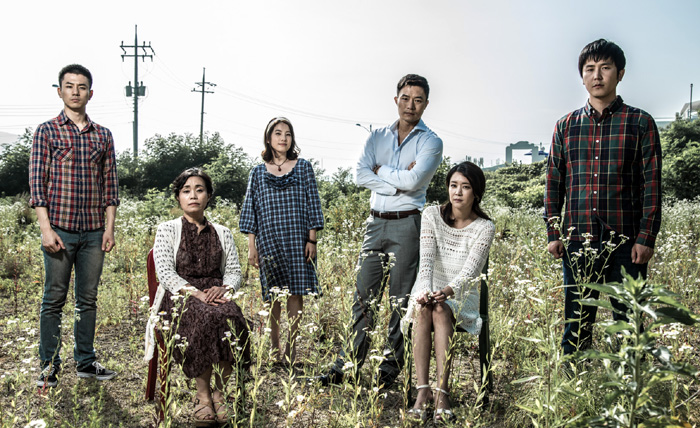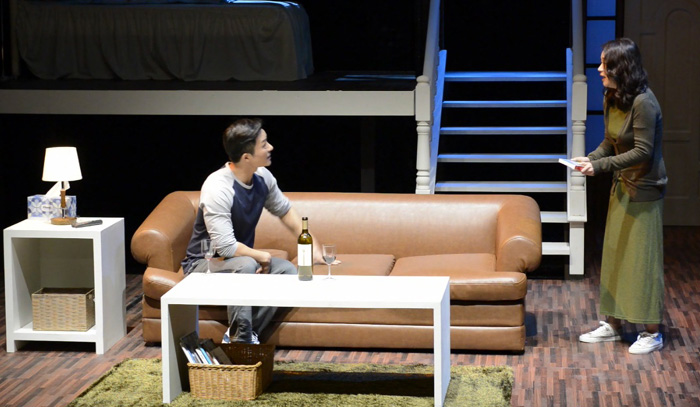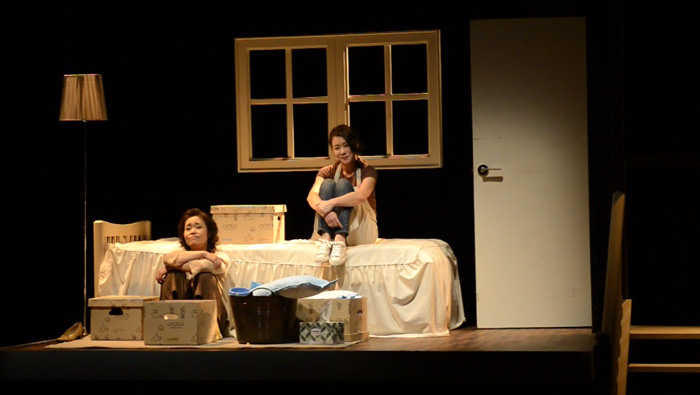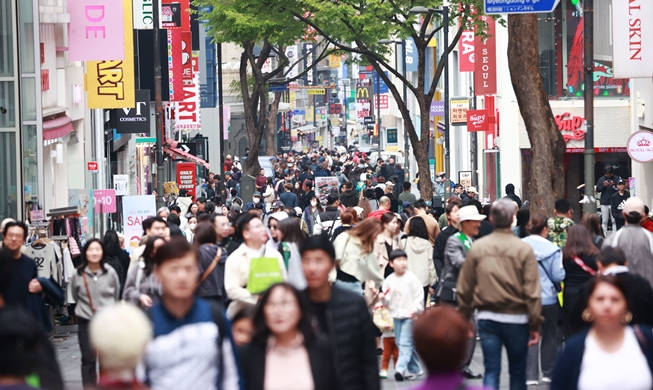-
 Korea.net's 24-hour YouTube channel
Korea.net's 24-hour YouTube channel- NEWS FOCUS
- ABOUT KOREA
- EVENTS
- RESOURCES
- GOVERNMENT
- ABOUT US
“Rabbit Hole,” a play written by playwright David Lindsay Abaire, was initially staged at regional theaters across the U.S. in 2006. The play was popular enough to be nominated for five Tony awards that same year. In 2007, the work received the Pulitzer Prize for drama. The hit has now been revived in Korea with a domestic cast and with domestic stage settings.


The title “Rabbit Hole” stems from the renowned fairy tale “Alice in Wonderland.” Alice gets sucked into what seems like a rabbit hole, but it turns out to be a passage to an unknown world.
The play tells the story of a couple -- Becca and her husband Howie -- who have been plunged into grief after the huge unexpected loss of their son, Danny. The couple had been living a normal, peaceful life in the suburbs until their son was killed in a car accident. For them, the loss and the ensuing intolerable pain are a “rabbit hole,” a hole into which the heartbroken couple swirl ever downward.
Becca, struggling to remove all traces of her son from her life, has trouble with her husband, who tries to keep as many memories of the son as possible. Her sense of loss and pain deepens, with no sign of abating. One day, Becca runs into Jason Willette, the 17-year-old who accidently hit Danny with his car.
Feeling guilty, Jason writes a sci-fi novel titled “Rabbit Hole” in honor of the dead son, and sends the manuscript to Becca. In the book, there is a “rabbit hole” in the universe, a hole that is connected to many worlds outside of the universe, where each individual lives in an entirely different way.
The novel serves as a tool to bring Becca some peace and solace, as she imagines things to be happy and positive while she reads it.


“The play ‘Rabbit Hole’ focuses on the fact that, ‘No matter how harsh the things are that happen to us, we manage to get through them and continue to live,’” said director Kim Jae-hoon, who produced the play.
“When we accept loss, we can get back to normal and manage to live from day to day. I hope that the key message that the work intends to deliver, that, ‘The moment you accept loss, hope in life will come in sight,’ will be accepted by the audience, too.”
The current production will continue until September 6 at the Daehakro Arts Theater in Hyehwa-dong, Seoul.
By Sohn JiAe
Korea.net Staff Writer
jiae5853@korea.kr


Winner of the 2007 Pulitzer Prize for drama, the play “Rabbit Hole” is on stage at the Daehakro Arts Theater in Hyehwa-dong, Seoul, until September 6. (photos courtesy of the Joeun Theater)
The title “Rabbit Hole” stems from the renowned fairy tale “Alice in Wonderland.” Alice gets sucked into what seems like a rabbit hole, but it turns out to be a passage to an unknown world.
The play tells the story of a couple -- Becca and her husband Howie -- who have been plunged into grief after the huge unexpected loss of their son, Danny. The couple had been living a normal, peaceful life in the suburbs until their son was killed in a car accident. For them, the loss and the ensuing intolerable pain are a “rabbit hole,” a hole into which the heartbroken couple swirl ever downward.
Becca, struggling to remove all traces of her son from her life, has trouble with her husband, who tries to keep as many memories of the son as possible. Her sense of loss and pain deepens, with no sign of abating. One day, Becca runs into Jason Willette, the 17-year-old who accidently hit Danny with his car.
Feeling guilty, Jason writes a sci-fi novel titled “Rabbit Hole” in honor of the dead son, and sends the manuscript to Becca. In the book, there is a “rabbit hole” in the universe, a hole that is connected to many worlds outside of the universe, where each individual lives in an entirely different way.
The novel serves as a tool to bring Becca some peace and solace, as she imagines things to be happy and positive while she reads it.


Scenes from the recent production of the play “Rabbit Hole.” (photos courtesy of the Joeun Theater)
“The play ‘Rabbit Hole’ focuses on the fact that, ‘No matter how harsh the things are that happen to us, we manage to get through them and continue to live,’” said director Kim Jae-hoon, who produced the play.
“When we accept loss, we can get back to normal and manage to live from day to day. I hope that the key message that the work intends to deliver, that, ‘The moment you accept loss, hope in life will come in sight,’ will be accepted by the audience, too.”
The current production will continue until September 6 at the Daehakro Arts Theater in Hyehwa-dong, Seoul.
By Sohn JiAe
Korea.net Staff Writer
jiae5853@korea.kr
Most popular
- First hearing-impaired K-pop act hopes for 'barrier-free world'
- Expats could account for 7% of population in 20 years: report
- 'Mad Max' director impressed by 'cinema-literate' Korean viewers
- Show in Italy to present 'thought-filled' Korean craftworks
- Romanian presidential couple visits national cemetery













